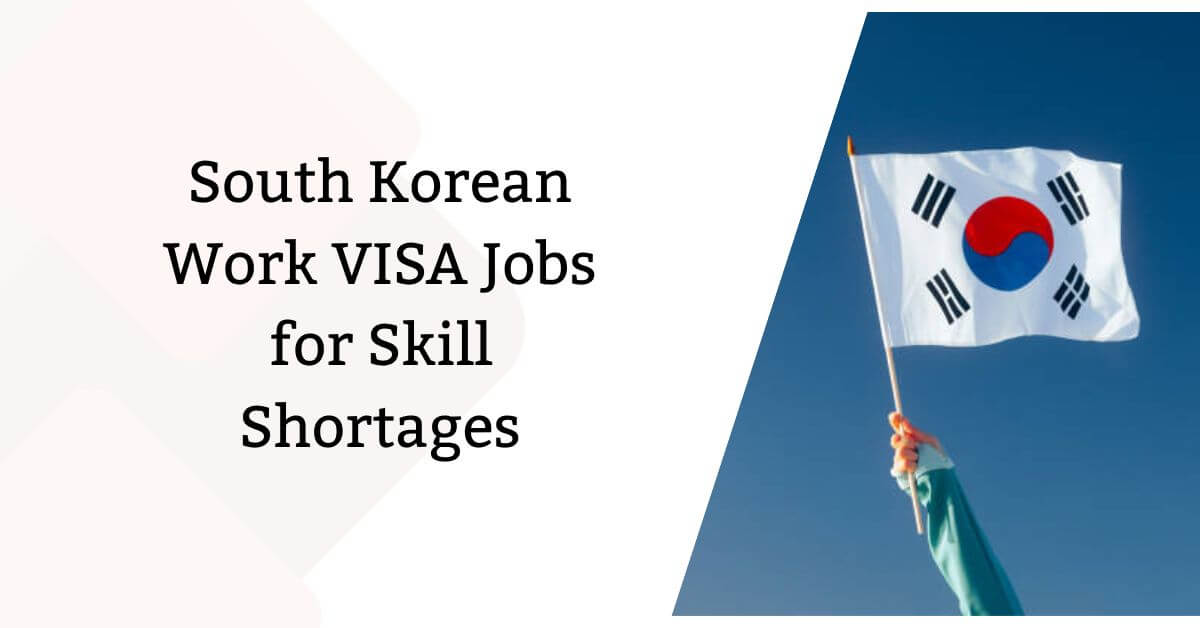South Korea is at a point where chance and challenge meet in a world economy that is changing quickly. The country needs to hire more people right away, especially in high-demand fields like technology, healthcare, and industry, where people are living longer and having fewer children.
This is a great chance for skilled workers all over the world to look into exciting job opportunities in one of Asia’s most exciting countries. Imagine making a big difference in South Korea’s booming industries while also adding to groundbreaking technological advances or medical breakthroughs. You could also enjoy the country’s rich cultural tapestry and modern way of life.
This detailed guide talks about the most sought-after degrees and jobs, the different types of visas that can help you live and work in South Korea, and the best ways to find your dream job in this amazing country. South Korea wants people with skills like yours, whether you’re an engineer, a healthcare worker, an IT expert, or a skilled tradesperson. Are you ready to start this journey?
Big Factors Contributing to South Korean Skill Shortages:
Two things make it hard for South Korea to find workers: its population is getting older and birth rates are low. Because of these things, there are big gaps, especially in the technology, agriculture, and industrial sectors. In response, the government has raised the number of visas available and pushed education in high-demand areas to bring in talented people from other countries.
In-Demand Degrees, Professions, and Trades in South Korea:
The fast-paced economy and businesses that depend on new ideas in South Korea need skilled workers in many areas. Here is a thorough list of the degrees, jobs, and trades that people want, along with the average salary for each.
List of In-Demand Degrees in South Korea:
South Korea is having a hard time finding people with the following degrees. That’s why the country is now letting private and public companies hire foreigners on work visas:
STEM Fields (Science, Technology, Engineering, Mathematics)
Computer Science, Data Science, Robotics, AI, Cybersecurity
- Average Salary: 70-100 million KRW (approx. $52,500 – $75,000) annually
- Key Roles: Software Developers, Data Scientists, AI Specialists, Cybersecurity Experts
Engineering: Electrical, Mechanical, Civil, Software Engineering
- Average Salary: 60-90 million KRW (approx. $45,000 – $67,500) annually
- Key Roles: Electrical Engineers, Mechanical Engineers, Civil Engineers, Software Engineers
Medical and Healthcare: Medicine, Nursing, Pharmacology
- Average Salary: 60-90 million KRW (approx. $45,000 – $67,500) annually
- Key Roles: Doctors, Nurses, Pharmacists
High-Demand Professions in South Korea Are:
South Korea has recently found serious skill gaps in the following three jobs, which has led to the hiring of foreign workers with funded skill shortage visas:
Engineers
- Specializations: Software, Electrical, Mechanical, Civil
- Average Salary: 60-90 million KRW (approx. $45,000 – $67,500) annually
IT Professionals
- Roles: Software Developers, Data Analysts, Cybersecurity Experts
- Average Salary: 50-80 million KRW (approx. $37,500 – $60,000) annually
Healthcare Professionals
- Roles: Doctors, Nurses, Pharmacists
- Average Salary: 60-90 million KRW (approx. $45,000 – $67,500) annually
High-Tech Manufacturing Specialists
- Roles: Semiconductor Engineers, Robotics Technicians, Process Engineers
- Average Salary: 70-100 million KRW (approx. $52,500 – $75,000) annually
Skill Shortage Trades in South Korea:
The three trades below are new to South Korea’s list of those with skill gaps, and foreign workers are now being hired with skill shortage visas:
Construction Trades
- Roles: Carpenters, Electricians, Plumbers, Welders
- Average Salary: 40-60 million KRW (approx. $30,000 – $45,000) annually
Manufacturing Trades
- Roles: Machine Operators, Welders, Assembly Technicians
- Average Salary: 30-50 million KRW (approx. $22,500 – $37,500) annually
Agriculture
- Roles: Farm Managers, Agricultural Technicians
- Average Salary: 30-50 million KRW (approx. $22,500 – $37,500) annual
Requirements:
South Korea has many types of work visas to get skilled foreign workers to fill in the gaps in its own population. Here is a list of the main types of work visas and the requirements to get them:
E-7 Visa (Specific Activities)
Subcategories:
- E-7-1: For people who have at least a bachelor’s degree and work in areas like medicine, engineering, law, education, and more.
- E-7-2: For individuals with exceptional abilities in arts, sports, or other specialized fields.
- E-7-3: For investors or entrepreneurs contributing to the South Korean economy.
- E-7-4: On certain types of visas (E-9, E-10, or H-2) for skilled workers who have lived and worked legally in South Korea for at least four years.
Eligibility
- Job Offer: An official job offer from a South Korean company.
- Qualifications: The right kind of education and job experience.
- Clear Criminal Record: You must show proof of not having a criminal record.
- Health Check: You have to get a medical check.
D-8 Visa (Corporate Investment)
Eligibility
- Investment: putting at least USD 70,000 into a South Korean business.
- Active Participation: You must take an active role in running the business.
- Relevant Field: That Matters: The business must be in an area that matters because of the lack of skills.
D-9 Visa (Trade Management):
- Trade Managers: This is for foreign trade managers who work for a Korean trading company or who are starting their own trading company in South Korea.
F-2 Visa (Residence):
- Subcategory: F-2-7: Points-based system for skilled workers.
- Eligibility: Points System: You get points based on your age, schooling, work experience, and how well you speak Korean. To qualify, you need to get a certain number of points.
F-4 Visa (Overseas Koreans):
- Eligibility: Ethnic Koreans: For ethnic Koreans (including those with foreign nationality) who can show Korean language proficiency or have specific skills.
Check Also: South Korean Work Visa for Job Seekers
List of 5 Requirements for All South Korean Work Visas:
- Job Offer: Usually, you need a job offer from a South Korean company.
- Qualifications: You must meet the exact requirements for education and work experience for this type of visa.
- Background check for criminal records: must have no criminal records.
- Health Check: You must pass a physical test.
- Language Skills: Being able to speak and understand Korean may be needed for some types of visas, but it’s not always necessary.
Benefits of South Korean Work VISA Jobs for Skill Shortages:
- Visa Sponsorship: Visa sponsorship is a common practice among numerous South Korean companies in order to attract competent foreign workers, thereby simplifying the immigration process.
- Competitive Salary Packages: Positions that address skill shortages frequently offer increased salaries and additional benefits to attract international talent.
- Cost of Living Support: In South Korea, employers may offer accommodation assistance, transportation allowances, or stipends to mitigate living expenses.
- Access to High-Demand Sectors: Foreign laborers have the opportunity to capitalize on high-demand job opportunities in sectors such as manufacturing, engineering, IT, healthcare, and education.
- Professional Development: South Korea provides access to state-of-the-art technologies and training, which can significantly improve your career prospects and skills.
- Cultural Experience: The opportunity to work in South Korea provides an opportunity to immerse oneself in a dynamic, contemporary lifestyle and rich cultural traditions.
- Permanent Residency Pathway: Long-term employment may result in permanent residency options, which would enable you to remain and work in South Korea indefinitely.
- Safe and Modern Work Environment: South Korea’s workplaces are distinguished by their efficiency, modernity, and safety, which guarantee a productive work environment.
- Networking Opportunities: By collaborating with industry leaders in sectors that are currently experiencing a shortage of skilled personnel, you can establish a professional network that spans the globe.
- Government Support Programs: The South Korean government provides active support to industries with skill gaps, thereby assuring the stability and job security of foreign workers.
Where to Find Jobs in South Korea With Work VISA?
South Korea’s growing economy needs people with skills like yours, whether you are an engineer, work in healthcare, IT, or trades. This article tells you how to find a job in South Korea. It lists the best job boards and recruitment companies to get you started.
South Korean Government Job Portals:
- WorkNet (워크넷):The Korean Ministry of Employment and Labor runs WorkNet, which is an official job site. It has many job listings in many different fields, for people looking for work in the United States and other countries.
- Seoul Global Center: The Seoul Global Center helps foreigners living in Seoul in many ways, such as by posting jobs, giving work advice, and helping them fit in.
You can also find jobs with work visa in South Korea at these 2 platforms:
- JobKorea (잡코리아): JobsKorea is one of the biggest job boards in South Korea, and it lists jobs in a lot of different fields. It is a great place for people from all over the world to find jobs.
- Saramin (사람인): Saramin is another big job site in South Korea that has a lot of job openings for people from all over the world. Recruiters and people looking for work both use it a lot.
Conclusion:
The way South Korea’s economy is changing is a huge chance for skilled workers around the world. Focusing on high-demand areas like healthcare, technology, and industry has made it easier for foreigners to find jobs and get visas. South Korea wants skilled people to work in its booming industries, whether you’re an engineer, a healthcare worker, an IT expert, or a tradesperson. This guide talks about degrees, jobs, visas, and job boards that are in high demand in one of Asia’s most exciting countries. Use them to start your career.
Frequently Asked Questions:
What are the average salaries for skilled workers in South Korea?
Skilled workers make between 30 and 100 million KRW a year, but the exact amount depends on the industry and the job.
What types of work visas are available for foreign workers in South Korea?
South Korea offers various work visas such as the E-7 Visa for specific activities, D-8 Visa for corporate investment, D-9 Visa for trade management, F-2 Visa for residence, and F-4 Visa for overseas Koreans.
Is there a job shortage in South Korea?
In order to address its labor shortage, South Korea has been employing menial foreign labor. A specific number of them had been accepted by the nation for a long time; however, the policy was recently extended. In the past, it would accept 50,000 to 60,000 unskilled foreign laborers yearly. They expect to receive 165,000 of them.






